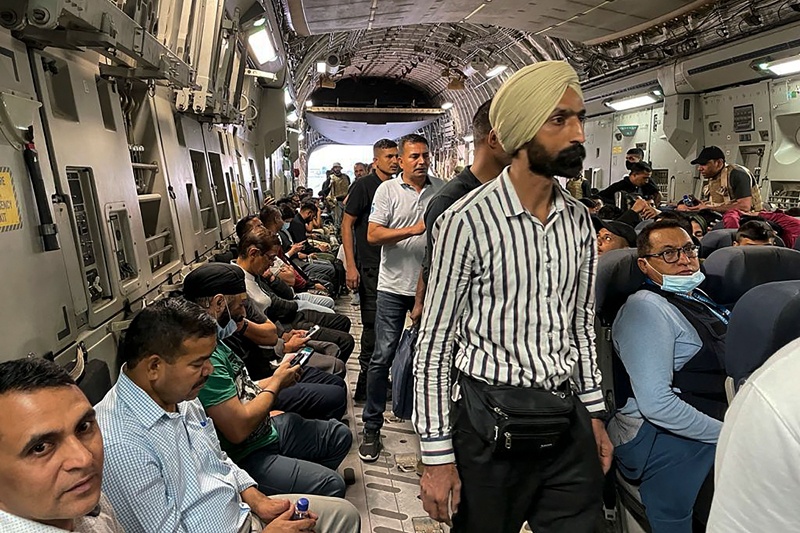 KABUL: Indian nationals sit onboard an Indian military aircraft at the airport on Tuesday to be evacuated from Afghanistan. – AFP
KABUL: Indian nationals sit onboard an Indian military aircraft at the airport on Tuesday to be evacuated from Afghanistan. – AFPKABUL: Outside the main iron gate of the Indian embassy in Kabul, a group of Taleban fighters waited - armed with machine guns and rocket-propelled grenade launchers. Inside the compound were 150 Indian diplomats and nationals - growing increasingly nervous as they watched news of the Taleban tightening their grip on the capital, which they took a day earlier without a fight. Their position was a precarious one.
Pakistan has long been the Taleban's biggest supporter, using the country for so-called strategic depth in never-ending battles - real and diplomatic - with archrival India. India in turn, strongly backed the government that took over when the Taleban were ousted, earning them hatred and enmity from the hardline Islamist group.
But the Taleban fighters outside the Indian embassy weren't there to extract revenge, but rather to escort them to Kabul airport, where a military aircraft was on standby to evacuate them after New Delhi decided to shut its mission. As the first of nearly two dozen vehicles drove out of the embassy late on Monday, some of the fighters waved and smiled at the passengers - an AFP correspondent among them.
One guided them towards the street leading out of the city's green zone and on the main road to the airport. The embassy's decision to ask the Taleban to shepherd the Indians out was made when the fighters closed access to the once heavily fortified neighborhood after capturing Kabul the previous day. A quarter of the 200 or so people who had gathered at the foreign mission had already been flown out of Afghanistan before the country's new leaders took full control of the city.
"When we were evacuating the second group... we faced the Taleban, who refused to allow us to exit the green zone," said an official who left with Monday's group. "We then decided to contact the Taleban and ask them to escort our convoy out." Two separate pledges of an escort failed to materialize during the day, unnerving the large group bunkered down at the embassy, with one diplomat likening the experience to "house arrest".
It had been dark for several hours when the cars finally left the compound and embarked on the five-kilometer journey to the airport. The snail-paced journey took five hours, with passengers passing each minute in constant fear of a potential attack. Unfamiliar checkpoints had been set up and thousands of people displaced by the war were along the road.
At intervals, the Taleban fighters accompanying the Indian convoy jumped out of their own vehicles and aimed their guns at the crowds, forcing them to step back. One man who appeared to be commanding the troops fired a few rounds in the air to scare back a large group gathered around one intersection. The escort departed once the convoy reached the airport, where American soldiers had taken up positions and were coordinating flights.
After a wait of another two hours, the group boarded a C-17 Indian military transport plane that took off at dawn, landing at an air force base in the west Indian state of Gujarat later that morning. "I'm so happy to be back," Shirin Pathare, an Air India employee flown out of Kabul, told AFP as he stepped off the aircraft. "India is paradise".
Another Indian citizen, cradling his two-year-old daughter, recalled the chaos and anxiety of his hasty departure from his office and the city. "Just hours before I took the flight a group of Taleban visited my workplace," said the man, declining to give AFP his name. "They were polite but when they went, they took two of our vehicles. "I immediately knew it was time for me and my family to leave," he added. - AFP










